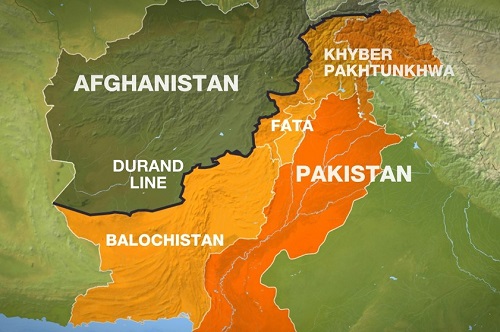By
Muhammad Shoaib Khan
In the eighteenth and nineteenth century, two major powers were overpowering the world; Great Britain and the Russian Empire. Both were expanding in different directions, the former towards the East and North, the latter the West and South.
At some point in time there was a chance of collision between these two powers during their expansion. Their focal point of collision was Afghanistan. Afghanistan has a rich historical background with reference to territorial issues with other countries. Since at that time the subcontinent was under the rule of Great Britain, the Emir of Afghanistan Abdur Rahman Khan requested the Viceroy of British India (now Pakistan) draw a demarcation line to get over with the chances of collision. The then Viceroy, after recommendations of the commission, formed the boundary line between British India and Afghanistan to be made for this perspective. Sir Mortimer Durand proposed to draw the line of Afghanistan in 1893 with British India and was hence named the Durand Line a.k.a Pak-Afghan Border, the Afghanistan Emir accepting the proposed formation of the Durand Line.
Later in 1947, British India was divided and two countries emerged on the world map, named as Pakistan and India. Due to the instability of Pakistan, Afghanistan tried to take advantage of it. Afghanistan refused to accept the Durand Line agreement and claimed that it was nullified after the division of the subcontinent and had no legal means. They further demanded to include Balochistan and NWFP (now Khyber Pakhtunkhwa) as a part of the Afghan territory because of the Pashtun majority. This nonsensical demand was obviously rejected by Pakistan because the majority of Pashtun tribes were a part of Pakistan instead of Afghanistan. All of this resulted in the decision that the Durand Line agreement could not be nullified. This initiated the bitter relationship between the two countries from Pakitan’s birth.
The abhorrence of Afghanistan kept on increasing, which was evident when it was the last country to recognize Pakistan as a member state of the United Nations. At the same time the USSR expansionist design kept on increasing because their intention was to reach warm waters, their way to these through Afghan territory which was resisted by the Taliban resulting in the defeat of USSR in the late twentieth century. Once again Afghanistan accused Pakistan of backing the Taliban against the Soviets to which Pakistan denied the allegations. The USSR-Afghanistan war eventually ended resulting in the creation of central Asian states on the world map. This whole incident added more bitterness to Pak-Afghan relations.
After the Afghan war Pakistan recognized the Taliban government as it was the voice of the Afghan people. Following 9/11 in the United States, former President George W Bush wages war against Afghanistan claiming that the Twin Tower attack was planned within the Afghan territory. The U.S. justified their attack on Afghanistan as the ‘War on Terror’ in which NATO and western countries supported the U.S. stance. Due to this attack the Afghan community was displaced internally and sought refuge in other countries. At that time it was Pakistan who helped the Afghan people by opening its borders to facilitate Afghanis on a humanitarian basis. Even then the Afghan government did not recognize this humane act of Pakistan.
Pakistan also suffered from the war on terror because of the shared border. Instead of building good relations with Pakistan, the former maintained relations with enemies of Pakistan. Thus the Afghan territory was offered as a help to India, to destabilize Pakistan (recently confessed by an Indian Spy caught in Pakistan). For this purpose, India has the highest number of consulates in Afghanistan, a violation of diplomatic norms. Behind the curtain the performance of India in the destabilization of Pakistan is not hidden from the international community. Pakistan has provided proof on multiple occasions to Afghan officials to prove the role of India in sabotaging Pak-Afghan relations.
Even recently, the Pakistan territory was attacked by Afghan forces, killing civilians along with soldiers. The Pakistani government registered their protest diplomatically against the Afghan forces stating these type of acts will create hurdles in the maintenance of healthy relations among both countries. Nevertheless it is a long debate as to why Pakistan-Afghanistan relations are bitter rather than friendly. But now both countries should figure out that external forces are hiding behind the curtain and trying to destabilize the friendly relations between the two neighbouring states. Afghanistan is a pivotal part of South Asia, considered as ‘Heart of Asia’, so its stability and peace is important to Asia as well as Pakistan.
Afghanistan should recognize Pakistan’s efforts in maintaining peace within their territory and also be obliged for facilitating their refugees within Pakistan for almost the last two decades.
Muhammad Shoaib Khan
Muhammad Shoaib Khan is a journalist from Pakistan and has worked with NEO TV, Independent News, PBCand The Nation.



No Comments Yet!
You can be first to comment this post!